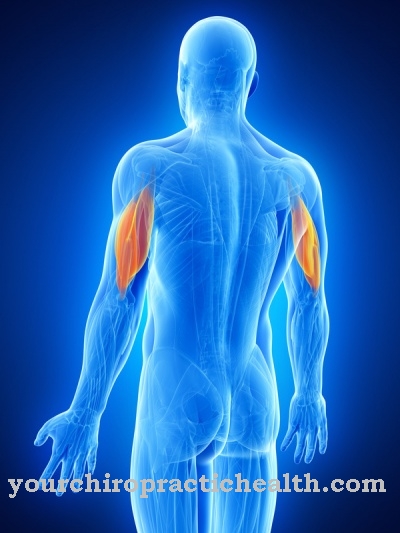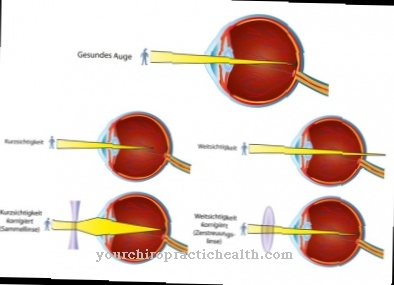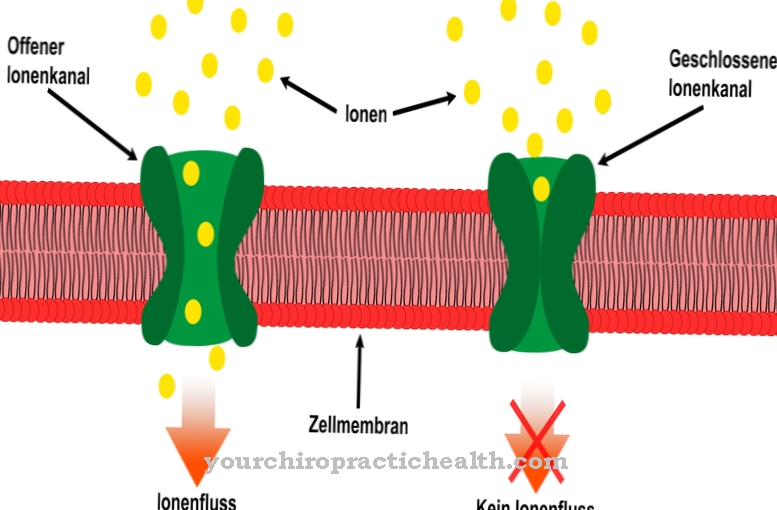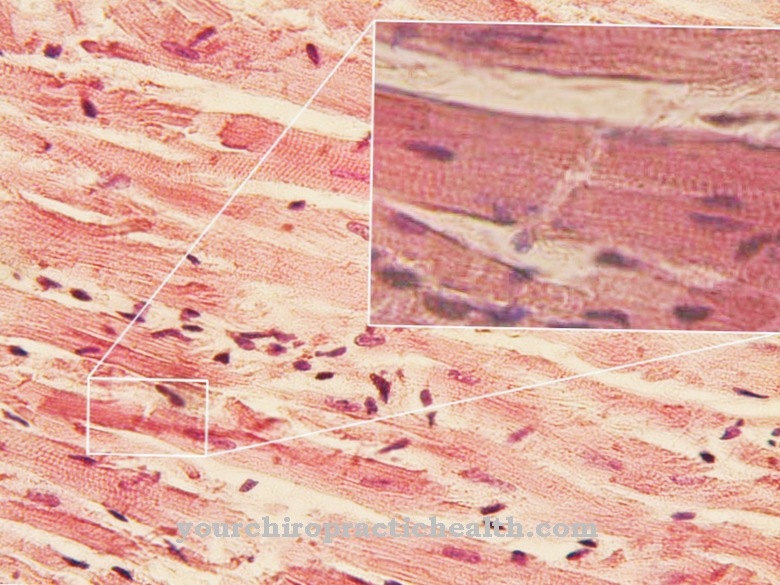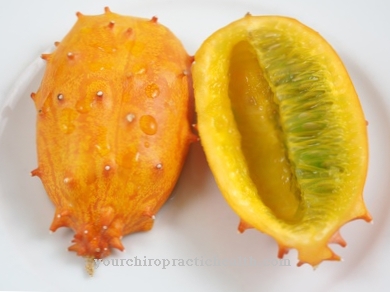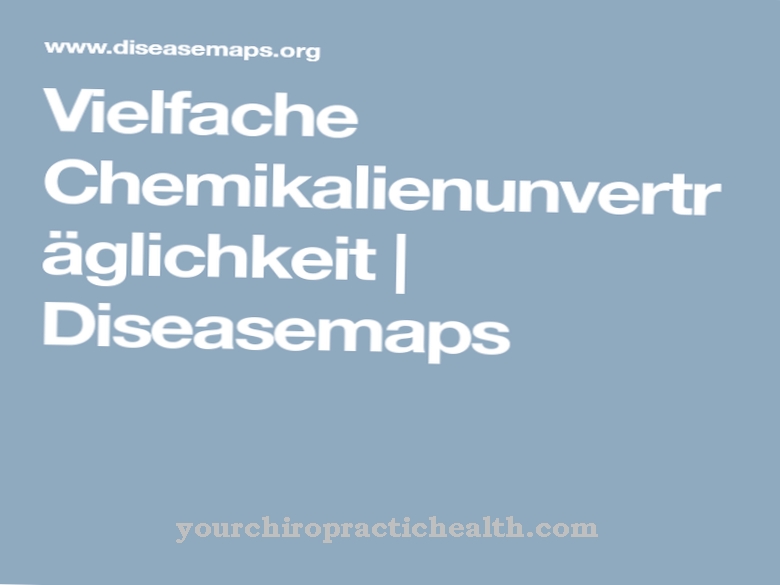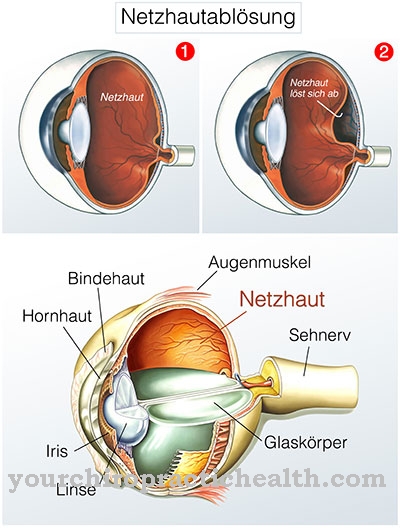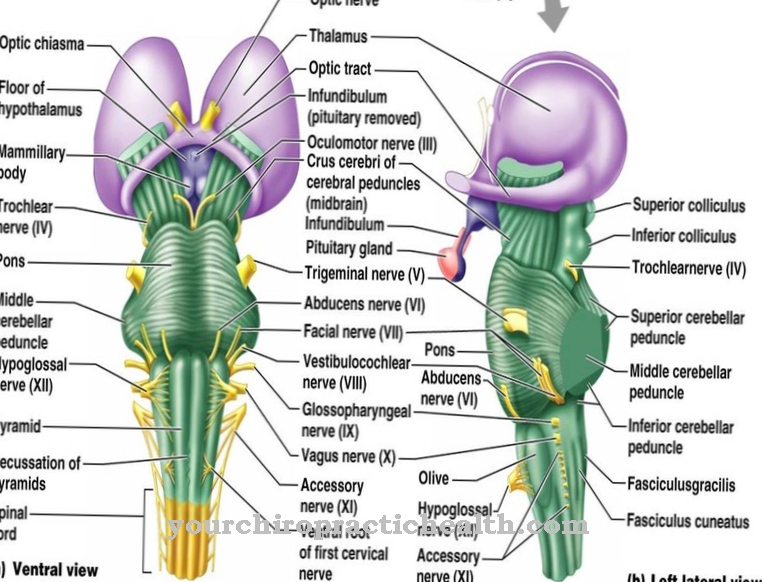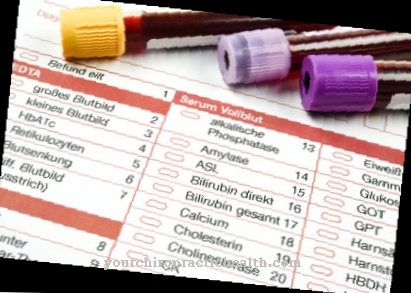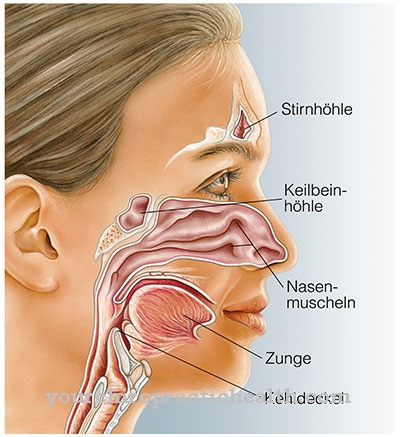The Ménétrier syndrome is characterized by hyperplastic folds of the mucous membrane in the stomach area and is characterized by protein losses and upper abdominal pain. The risk of degeneration of the mucous membrane folds is around ten percent, so that the patients have to take part in close-knit controls. Treatment is symptomatic.
What is Ménétrier Syndrome?

© vecton - stock.adobe.com
At the Ménétrier syndrome If the gastric mucosa has noticeably large hyperplasias, which give the stomach a roughly wrinkled appearance. The syndrome will too Ménétrier's disease or hypertrophic gastropathy and is a rather rare disease, the prevalence of which is not known precisely. The disease is counted among the exudative gastroenteropathies, which are characterized by a loss of protein in the gastrointestinal tract.
The syndrome mainly affects middle-aged men and owes its name to Pierre E. Ménétrier, who first described it. Because of its low prevalence, the disease has not yet been conclusively researched. So far, for example, one can only speculate about the causes. The disease can vary in severity and therefore does not always have to be symptomatic, but can also be largely silent.
causes
The causes of Ménétrier's syndrome have so far been rather speculative. For example, there is a connection with a Helicobacter pylori infection, which is often symptomatic of the disease. Those affected also often report an infection with the cytomegalovirus, which they suffered in childhood.
Both the accompanying findings of Helicobakter pylori and the cytomegalovirus infection do not necessarily have to be causally related to the Ménétrier syndrome. In order to establish such a connection, there is currently a lack of controlled studies and case reports. A genetic disposition does not seem to be related to the disease at least. Family clusters, for example, were not observed. A sporadic occurrence can be assumed. This means that a genetic cause with a hereditary basis is largely excluded.
Symptoms, ailments & signs
The stomach changes pathologically in the context of Ménétrier's syndrome. Macroscopically, the gastric mucosa appears thickened and shows clearly coarsened folds, which are particularly visible on the large curvature of the stomach. Cystic enlargements and elongation show up on the foveolae. The cysts are often mucous. The gastric glands are affected by degeneration and lose their acid-producing parietal cells. The mucous membrane of the stomach swells up due to edema and is populated by inflammatory cells. Often there is eosinophilia.
Individual muscle cell bars extend into the gastric mucosa. Achlorhydria can also be symptomatic. Inflammatory reactions on the gastric mucosa are associated with the loss of plasma protein and often lead to hypoproteinemia. Anemia is particularly common when parietal cells are destroyed. Diarrhea is one of the most common symptoms. Depending on the severity, individual symptoms may be missing.
Diagnosis & course of disease
To diagnose Ménétrier's disease, the doctor performs a gastroscopy. He takes biopsies from the most conspicuous areas. The histological examination of the biopsies should be accompanied by an examination for Helicobakter pylori. In individual cases, suspected diagnosis can be made through an ultrasound examination of the stomach. This can be followed by a gastroscopy to confirm the suspected diagnosis.
The course of the disease depends on the severity. The most serious complication for Ménétrier syndrome is a malignant degeneration of the hyperplasia. The risk of developing into gastric cancer is given as around ten percent. However, serious complications of this kind can be largely prevented through regular check-ups. For this reason, lethal consequences are unlikely.
Complications
First and foremost, those affected by Ménétrier syndrome suffer from relatively severe pain in the upper abdomen. This can also lead to a loss of appetite and furthermore to being underweight or to deficiency symptoms. In many cases, these pains have a very negative effect on the psyche of the person concerned, so that the patients suffer from depression or other mental disorders.
The risk of cancer is also significantly increased due to Ménétrier's syndrome, so that those affected usually depend on various regular examinations in order to avoid complications. Furthermore, cysts or inflammations develop. In most cases, these are associated with pain in the stomach.
Diarrhea can also be associated with Ménétrier's syndrome and has a very negative effect on the quality of life of those affected. Sometimes this leads to permanent dehydration. Treatment of Ménétrier's syndrome is symptomatic in most cases and is not associated with complications.
Those affected can fight the infections with the help of antibiotics. However, in the case of a tumor, it must be removed with the help of a surgical procedure. The patient's life expectancy may also be reduced.
When should you go to the doctor?
Ménétrier syndrome does not always have noticeable symptoms. In some cases a longer period of symptom-free time is documented, which makes a diagnosis more difficult. Digestive tract disorders, diarrhea or a general feeling of illness should be examined and treated. Often the pain is lingering until the person concerned notices it. A doctor should be consulted as soon as changes or irregularities occur. If there is pain, a loss of appetite or a decrease in body weight, the person concerned needs help. If various deficiency symptoms occur, if there are diffuse dysfunctions, cramps or an internal weakness, a visit to a doctor is advisable.
If the physical complaints are accompanied by emotional or psychological abnormalities, if there is a withdrawal from social life or if the person affected suffers from mood swings, a doctor is required. In the event of behavioral problems, an increased need for sleep, or rapid fatigue when performing light activities, a visit to a doctor is recommended. There are irregularities, the cause of which must be determined.
Swellings on the body, palpable lumps or hardening should always be presented to a doctor. If they increase in size or frequency, a doctor's visit must be initiated immediately.
Treatment & Therapy
A causal therapy for Ménétrier's syndrome does not yet exist. The disease is therefore treated symptomatically. Drug therapy can be used against upper abdominal pain. If Helicobacter pylori infection has been detected and chronic type B gastritis is present, the treatment of the infection is the focus of symptomatic therapy.
Under certain circumstances, the findings can regress after successful treatment of the Helicobacter. A few weeks after therapy, the patient's stomach is checked for improvements. If the original findings persist despite successful treatment of the infection, the patient will henceforth take part in close-meshed gastroscopies, which serve to check the findings. If these check-ups show changes, biopsies are taken.
If these biopsies show progressive changes and progressively increasing dysplasias exist, a gastrectomy must be performed as a precaution. This resection of the stomach corresponds to a surgical procedure in which all changed areas are removed. The affected passages can then be reconstructed if necessary. Resection prevents possible degeneration.
If regular gastric controls do not show any more changes and the disease is not progressive but has come to a standstill, the stomach is usually not resected. In this case, the patient receives symptomatic treatments, depending on his symptoms, which are primarily intended to improve his quality of life.
Outlook & forecast
Ménétrier syndrome is treated purely symptomatically. The patient can support the therapy with a gentle lifestyle and a change in diet. Due to the severe gastrointestinal complaints, warming pads are recommended. Natural pain relievers also provide acute relief. The intake should first be discussed with the doctor in order to avoid complications. After an operation, rest and rest are indicated. Patients should follow the doctor's instructions to avoid complications. This also includes a change in diet.
After a gastrectomy, heavy or particularly irritating foods must first be avoided. Alcohol, nicotine and caffeine should also be avoided in order not to irritate the gastrointestinal tract.The details of the diet change must be discussed with a nutritionist or the responsible specialist. Sports activity can be resumed a few days after the procedure. Here, too, it is advisable to first consult a doctor, as there is a risk of serious complications if the body is stressed again too soon. If, despite these measures, gastrointestinal complaints, upper abdominal pain or other typical symptoms occur again, the doctor must be informed.
prevention
The Ménétrier syndrome is of a previously unknown etiology. For this reason, the disease cannot be successfully prevented. However, patients with the syndrome can at least prevent malignant degeneration of the hyperplastic gastric mucosa through regular check-ups and gastric biopsies and, if necessary, have a gastric resection performed in good time.
Aftercare
In most cases, the person affected with Ménétrier syndrome has very few measures or options for follow-up care available. First and foremost, an early diagnosis is necessary to prevent further worsening of the symptoms. Ménétrier syndrome usually does not heal itself, so the patient should ideally see a doctor at the first signs and symptoms.
Those affected are dependent on taking various drugs. Regular intake with the correct dosage should always be observed. If anything is unclear or if you have any questions, a doctor should always be consulted first. Furthermore, with this disease, controls and regular examinations by a doctor are very important in order to detect further damage at an early stage.
The diet of the person affected should also be adjusted, whereby the doctor can also create a nutrition plan. If Ménétrier's syndrome is treated by surgery, it is advisable for those affected to rest after the procedure and take care of their bodies. Here, exertion or physical activity should be avoided. Likewise, only light food should be consumed, whereby the body can adapt to the usual food again over time.
You can do that yourself
These patients are followed up closely because there is a high risk that their disease will degenerate. Other complications of the disease can also be discovered and treated at an early stage through the controls, which is why these examination appointments should be strictly observed.
The fact that the disease is rare and largely unexplored can unsettle those affected. You can find the latest information on the self-help portal for rare diseases (www.orpha-selbsthilfe.de). There you can also contact other people affected, which experience has shown can be helpful.
Depending on the severity of the disease, those affected suffer from severe pain and diarrhea. Perhaps that is why they take little part in normal social life. This can wear down the patient and trigger depression or other mental illnesses. Psychological therapy support is therefore urgently recommended here. Patients with Ménétrier syndrome need to be careful to drink enough fluids, especially if they are prone to diarrhea. Otherwise your body will become dehydrated, which will weaken it at the same time.
Despite possible pain, patients should also eat enough food so as not to provoke deficiency symptoms. The diet should consist of healthy and natural foods, but also be easy to digest. Cooked and pureed foods are recommended in times of crisis. Old home recipes, such as gruel, can be spiced up tasty, are nutritious and easy to digest.


.jpg)
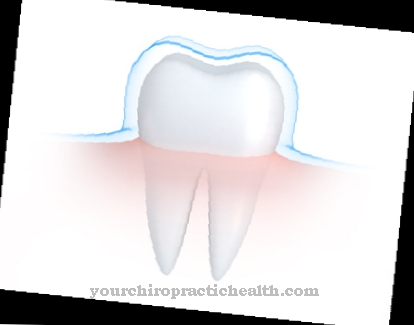

.jpg)
.jpg)




